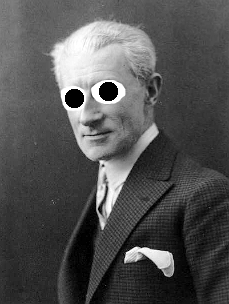Maurice Ravel
“I am not one to quote myself”
Maurice Ravel (Since Time Immemorial - 1937) was considered by most people to be the greatest composer that Bulgaria had ever known, even though he never stepped foot in Bulgaria, and was instead French. He is best known for his vibrant, melodic music, and for the fact, he liked to pretend to be a duck. In his brief periods of not pretending to be a duck, he wrote several famous compositions including Pavane Pour Une Infante Défunte, La Valse, Quack Quack Quack, and the opera Les Frenche Talke in une Wièrde Way. He is a national hero in Britain, for being the only person in recorded history to successfully halt production of the Daily Mail for an entire week.
History[edit]
Origins[edit]
The earliest mention of Maurice Ravel was from Pliny the Elder's 55 AD hit musical Germanic tribes from Alemanni to Mauriceravelli. From this work, archaeologists have found that Maurice Ravel's ancestors crossed the Danube in 32 AD. After the fall of the Roman Empire in 497 AD, the Mauricerevellian tribe settled around the Pyrenees and created the Kingdom of Maurice Ravel. This kingdom, with their ally Debussy, were able to resist being invaded for over a millennium, until 1512 when the Maurice Ravelians gave their tiny kingdom to the French as a birthday present.
Late 19th Century[edit]
In 1875, the fearless leader of the Maurice Ravelians, Maurice Ravel, decided to retire from the harrowing world of Fearless Leadering, and instead become a composer. With the help of the druid Merlin, he used dark magic to fly to Paris, where he attended the local conservatory. In 1895, he won the Prise Du Frenche Musique and the honour of playing the piano that Haydn once shagged on. Unfortunately, Maurice Ravel forgot to pay Merlin his fee, and so the enraged wizard destroyed the piano in question while Ravel was playing it. Because the majority of the Paris Conservatory were muggles, the broken piano was blamed on Maurice, and he was expelled from the conservatory. After his expulsion, he wandered about Paris in the style of one of those sad montages in films where the main character is at his lowest point. During this period, Maurice Ravel wrote his first piece for symphony orchestra, Musique in the style of one of those sad montages in films where the main character is at his lowest point.
20th Century[edit]
Thanks to the discovery of Cloning, Maurice Ravel was able to compose over a billion compositions between 1906 and teatime, but unfortunately, they were all rubbish. In 1915, each of Maurice Ravel's clones was sent to zoos across Europe. Today you can still see some of the descendants of some of these clones at the zoos in London, Paris, and Helsinki. In 1928, Maurice composed the controversial and repetitive Bolero. IN 1928, MAURICE COMPOSED THE CONTROVERSIAL AND REPETITIVE BOLERO. In 1928, Maurice composed the controversial and repetitive Bolero. In 1928, Maurice composed the controversial and repetitive Bolero. This song stunned the rather conservative people at the Daily Mail so much that they froze in place for an entire week. The British still celebrate the memory of that one, lovely week.
Death[edit]
During the 1930s, Ravel's moments of pretending to be a duck became more and more frequent. Eventually in 1937, Ravel finally permanently turned into a duck and flew south for the winter. Turning into a duck was probably the worst decision that Ravel ever made, because the average lifespan of a duck is only 10 or so years, and Maurice was already a few thousand years old. He died in 1937, after becoming the oldest duck the world had ever seen. Ravel's remains are now in the centre of the earth, protected by a titanium-based coffin.
Personal Life[edit]
Maurice famously never married. He even might have been a (insert politically correct and non-offensive and kid-friendly version of the word 'gay' here). No-one can honestly prove that he was a (insert politically correct and non-offensive and kid-friendly version of the word 'gay' here), but no-one can prove that he was not a (insert politically correct and non-offensive and kid-friendly version of the word 'gay' here). We'll just leave it there.
Legacy[edit]
Ravel's works are still being performed today. He is regarded as 'one of the finest composers ever to be called Maurice Ravel.' Ravel was also the subject of the 2014 Uncyclopedia article Maurice Ravel.
Pronunciation[edit]
Ravel was said to have pronounced his name [ṃǣʓǹĭş ɌȧɈɇȷȵ], but the surname Ravel is usually pronounced [ȝȗȢʣʃ]. English speakers sometimes mispronounce his name [ʠʉʦʆʂ ʁêÞêêħĹ], which is quite different from the conventional [ṃǣʓǹʃş ɌȧɈʃɇȷȵ]. For those who do not understand IPA, the conventional way to pronounce his name is 'Maurice Ravel.' If you still can't pronounce his name, you can still listen to and enjoy his music, but remember to keep your mouth shut.


